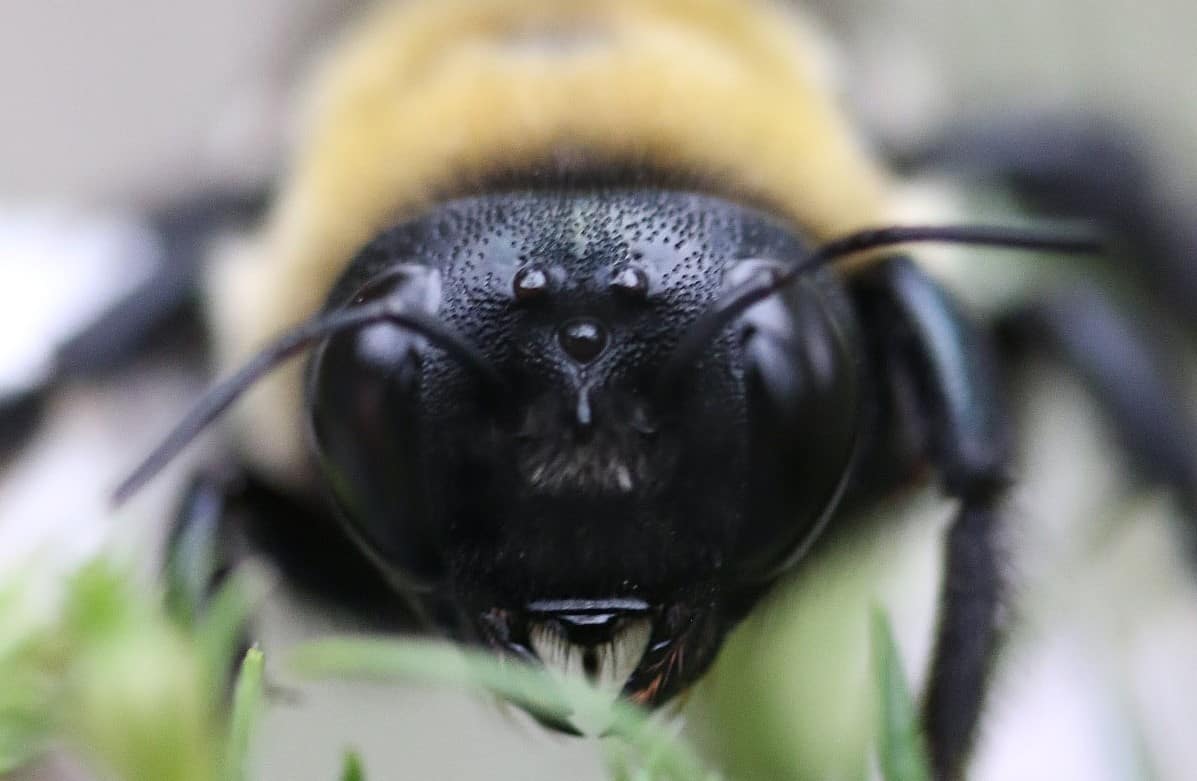Many people have encountered carpenter bees in their lives without knowing that these are carpenter bees. Those are the bees that hover and fly around your homes and create those holes in your wooden structures.
At first glance, these bees are similar to bumble bees, with an average size of less than an inch long and with six legs. The difference between these two species lies in their abdomens.
While the bumble bees have hairy abdomens with yellow markings, the carpenter bees have smooth and shiny abdomens.
But, when it comes to bees, one question always pops up to mind: does this bee sting?
This blog post will delve more into this specific question: do carpenter bees sting?
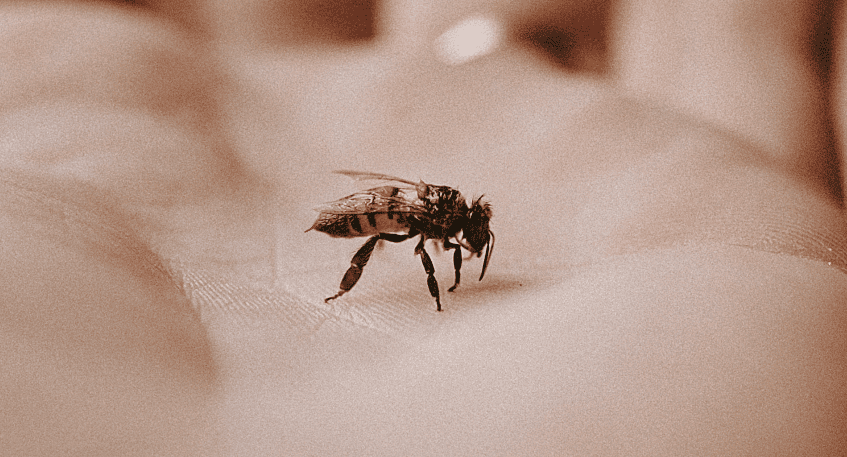
Are Carpenter Bees Dangerous?
Carpenter bees really are harmless insects compared to other aggressive ones that would attack and sting with just a minimal disturbance or even without provocation.
These docile bees are content with burrowing into any wooden structure. They merely go out to forage for flowers and bring home food.
Are Carpenter Bees Aggressive?
Carpenter bees are not aggressive insects. Unlike other aggressive ones, carpenter bees would not attack or sting you if you just left them alone.
When a carpenter bee flies close to you, there is nothing to worry about.
It is best not to shoo them away as it might just encourage them to get closer to you. Rather, slowly walk away and get as far away from the bee as possible.
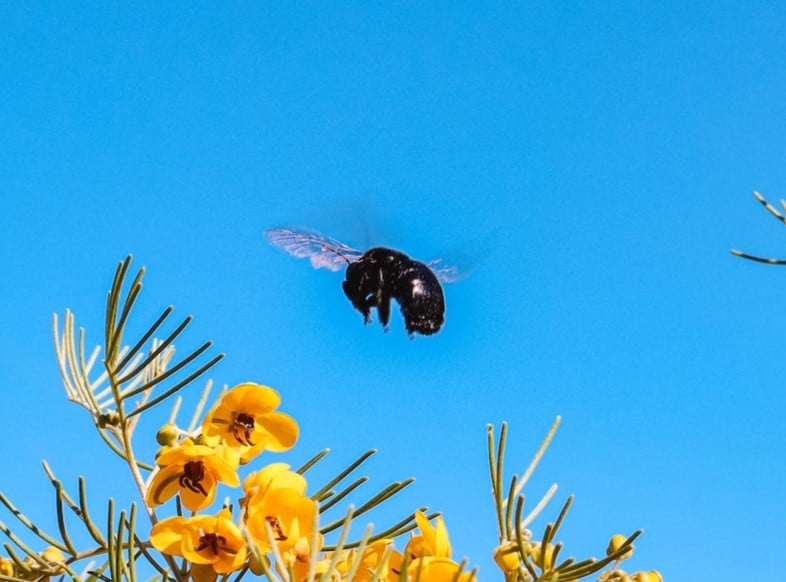
Should I be Scared of the Carpenter Bee?
There is nothing to be scared of when in the presence of the carpenter bee.
Male carpenter bees are territorial and hover near their holes. They get easily attracted to sudden movement. When alerted, they can hover near a person and follow him around. That’s the most they would do and will never sting you.
As long as you stay calm and can get away slowly, do so. Most likely, the bee would just hover where it is now and will not follow or chase after you.
If you have lots of wooden structures around your home, then there might be a reason for you to be scared of these carpenter bees. But not for reasons of getting stung or not.
Carpenter bees bore holes in wood around the house, and these holes will cause structural damage if left untreated for too long.
These bee holes house the bees’ eggs and larvae. The eggs and larvae are attractive to some predators that would seek out ways to reach them, causing more damage to your property.
So, if you have a house with lots of wooden parts, there might be a reason for getting scared of carpenter bee infestations, as these can cause severe damage to your house over time.
Do Carpenter Bees have Stingers?
There are two answers to this question. Yes and no.
Yes, female carpenter bees have stingers. And no, male carpenter bees do not have stingers.
Male Carpenter Bees
Most of the time, it is a male carpenter bee that you would see hovering around your porch or near some wooden structures. This male bee is tasked to protect the nest from other flying insects and wanderers.
Despite the lack of a stinger, the presence of these male carpenter bees alone can help deter other insects from burrowing into their holes. Along with their big sizes (for a bee) and the strong buzzing noise, anyone would definitely feel threatened when attacked by a male carpenter bee.
Female Carpenter Bees
A female carpenter bee, on the other hand, has a stinger but is not overly aggressive. It would only attack and sting if it felt the threat, such as when it is touched or handled.
Also, poking within bee holes might be perceived as a threat. At this point, these female bees would not hesitate to sting you.
The likelihood of getting in contact with a female carpenter bee is low since they usually stay close to their eggs and within their nests. So, unless you are specifically looking for them, chances are, your paths would not cross often.
These female carpenter bees sting with venom. What’s more, they can sting more than once. (Other bees, after stinging a person once, die shortly thereafter).
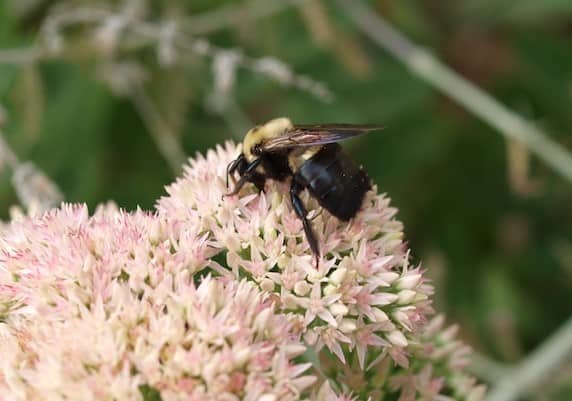
Do Carpenter Bees Sting Hurt?
A carpenter bee sting can be painful. Sharp pain and a burning sensation will be experienced that will later subside into a dull pain that could last for more than an hour.
This bee’s sting has a venom that contains melittin, the main pain-producing substance of bee venom. This venom causes a burning sensation around the sting wound. Indeed, carpenter bee stings hurt.
How to Avoid Getting Stung by a Carpenter Bee?
The simplest way to avoid getting stung by carpenter bees is to stay away from the bees. When one comes close to you, do not make sudden movements. Rather, remain calm and slowly walk away until you are a safe distance away from the bee.
When you find the need to remove or destroy a carpenter bee nest, never use your hands in handling it. It is best to destroy their homes when they are away, most of the time during the fall.
During this time, the carpenter bee nests would be empty as the adult bees would be roaming and looking for food. There are a few ways of getting rid of these bees without killing them and without even handling them closely.
What Happens if a Carpenter Bee Stings You?
A few seconds after having been stung by a carpenter bee, that particular area will swell and become red.
It is important to treat the stung area immediately to minimize pain and avoid complications.
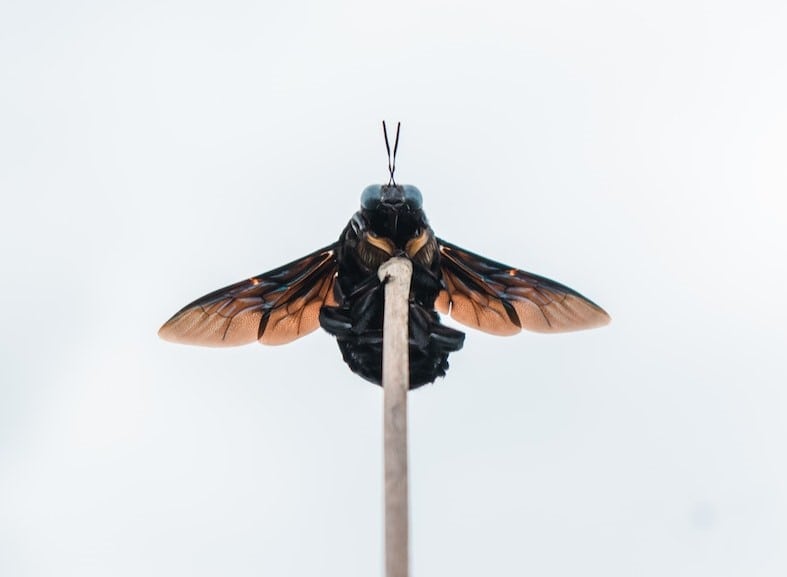
Bee Sting Treatment
Once a carpenter bee stings you, it is important to treat the affected area immediately. Clean the area of any dirt and wash it with antibacterial soap.
Allow the area to dry for the skin to breathe for a while. If there is any indication of swelling, apply a cool compress to soothe the swelling. A cooling gel or cloth can also help reduce inflammation.
For pain relief, oral pain medication may be taken as needed and as advised by medical professionals.
For some people, some allergic reactions may occur after a carpenter bee sting. If such is the case, it is important to seek immediate medical attention. When any sign of an allergic reaction manifests, medical intervention is necessary as soon as possible.
People who are highly allergic to bee venom may have difficulty breathing. It might lead to the dropping of a person’s blood pressure and a lack of oxygen in the body.
This may eventually lead to anaphylactic shock and loss of consciousness, and in cases of severe allergic reactions, may even result in death.
